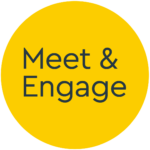This article was originally published by ERE. You can view the original article here.
By Ali Hackett
In the past year, employers have been forced to rethink their talent attraction strategies. The entire candidate experience has been flipped on its head. That includes companies’ approach to virtual recruiting events.
As the pandemic subsides, though, you might think that virtual events’ popularity will wane, but studies continue to show that TA leaders will continue to leverage online events as part of their recruiting strategies. But to do so effectively, companies will have to up their game to ensure that events cut through the noise and stand out from the crowd. Here’s how to do that.
Know Your Audience
Many employers often make the same fundamental mistake: They run yet another cookie-cutter event where a hiring manager or a recruiter talks at a candidate for 30 minutes about why their company is such a great place to work.
There’s nothing wrong with self-promotion, but to make your virtual event stand out, you need to deliver content that will truly resonate with your audience. This will vary depending on the organization and the candidates you’re trying to reach.
For example, you may have four or five different key persona groups they’re trying to hire (recent graduates, women in tech, senior professionals, etc.). And so you need to start by asking, “Who is my audience, and why should they care?”
Before planning a virtual hiring event, spend time internally discussing the motivators that will excite, interest, and inspire your audience. This could be practical considerations like how the interview process works or it might be more emotional drivers like what it feels like to overcome challenges and thrive at your company.
By creating full persona profiles, you can better plan the type of content you need to present during the event. Moreover, you’ll have a much firmer understanding of the types of messages you should be promoting to your audience pre-event. (Think custom marketing campaigns targeting people on their most-used social channels.)
Find the Right Tech Solution
This might seem like a given, but you’d be surprised to learn how many organizations struggle when it comes to selecting the right virtual-events technology. Platforms like Zoom and Teams might work great for internal meetings, but running live events for a wide range of candidate audiences is an entirely different ball game.
Many platforms have limitations, which may impact your ability to bring your employer brand to life and truly connect with people on a one-on-one basis. You’ll want to ensure your technology allows you to:
- Customize your event platform and fully-brand this with your unique employer brand
- Apply media tracking and tagging codes
- Run group and 1-one-1 chats
- Take advantage of live streaming functionality and support
- Include polls with instant feedback and sharing options
- Let candidates ask questions in a moderated setting
- Track data and analyze candidate feedback during and post-event
- Gauge net promoter score (NPS)
This list is by no means exhaustive, but it should give you a sense for the types of functionality you’ll want to look out for.
Turn Employees Into Brand Advocates
Remember, live events are a great way to showcase your organization’s strengths and reveal the ins and outs of what it’s truly like to work there. We’re talking about the things you can’t find on a static web page or in an employer brand video.
If you’re looking to attract a diverse or niche group, studies show that connecting those people with similar personalities and demographics within your company goes a long way towards building trust and belonging.
The alcohol-beverage company Diageo, for example, noticed that there were several key points in the recruitment journey where candidates stalled and needed support. In particular, they found a high number of female candidates weren’t completing the video interview stage. So to support candidates, Diageo launched a series of live events hosted by real women employees who had joined the graduate program the previous year. These women spoke about their own personal experiences within the company — the highs, the lows, and everything in between.
This highly authentic and genuine conversation led to a marked uptick in candidates’ confidence and trust levels. In fact, by the end of the sessions, 80% of the female candidates who had asked questions about the video interview stage went on to complete this step.
Simply put, you need to bring your employees’ experiences to life. This shifts the focus away from a “recruiter speaking at a candidate” to “someone that looks and sounds like me sharing their own personal experience.”
At a time when candidates trust a company’s employees three times more than the company’s general communications to provide credible information on what it’s like to work there, this can make all the difference.
Push the Boundaries
The act of hosting a virtual event alone won’t make you stand out, but your speakers, theme, and content can provide candidates with real value. Unfortunately, it’s common for virtual recruiting events to fall into a generic template and structure: “This is what we do, here’s how we do it, and this is what we have to offer. Any questions?”
There’s nothing wrong with this approach per se, but it certainly won’t make your online event stand out. If you’re looking for an example of a top-notch virtual-event series, then look no further than Accenture Live.
In 2020, the team at Accenture did a fantastic job of pivoting to a virtual-events strategy, creating and broadcasting more than 20 live candidate events over the course of the year. These events spanned technology showcases, practical workshops, panel discussions with guest speakers, and D&I sessions with current employees from diverse backgrounds.
These live sessions pushed the boundaries of virtual candidate events and included honest conversations about the pressing issues facing the company and society at large. With the help of subject-matter experts, Accenture explored questions around LGBTQ initiatives and hosted an event that addressed questions of race and diversity (in partnership with the company’s African & Caribbean Network).
In total, the company ran 22 virtual events, which drove 5,475 candidate sign-ups, 3.463 attendees, 2,000+ comments, and 22 hours of original content. From an employer-brand perspective, 85% of candidates said they were “very likely” to apply after attending the sessions.
All of which is a great example of how live virtual events can help you attract talent and stand out from the crowd — if you’re willing to push the boundaries and explore sensitive topics.
To become an employer of choice, you’ve got to show up in the way candidates expect. Increasingly, that place is online. By considering the practices above, you can better ensure that your next virtual event reaches the right people, stands out from the crowd, and turns interest into action.






